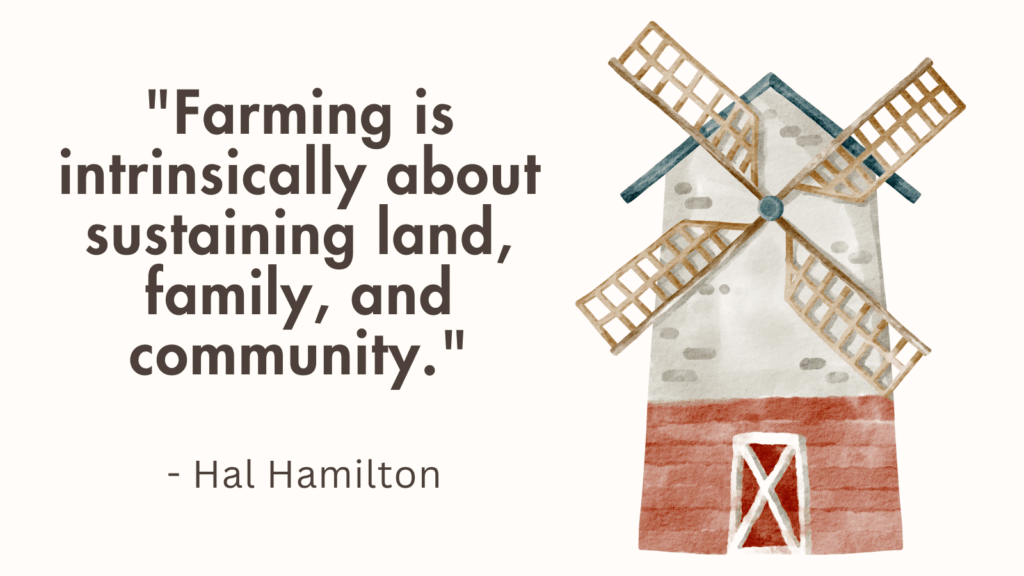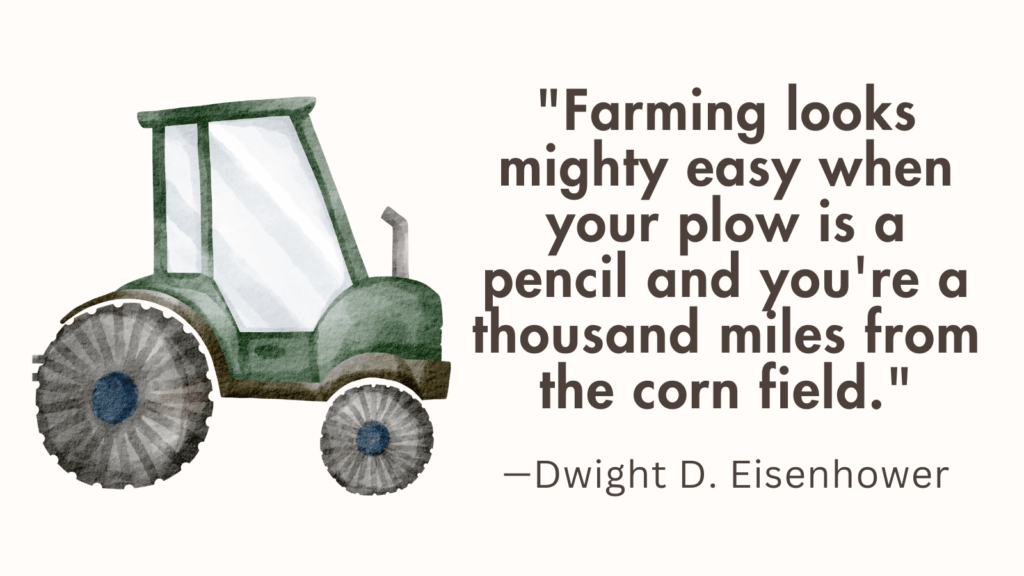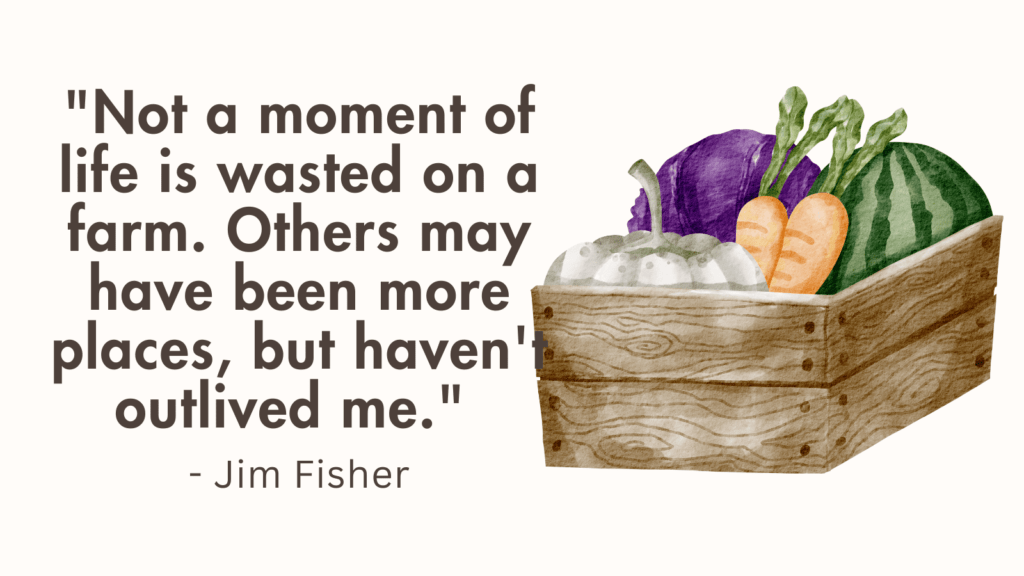In this post, you’re going to learn the difference between a farm and a ranch.
What Is A Farm?
A farm is an agricultural establishment or property where various types of crops, livestock, or other agricultural products are cultivated or raised.
It typically involves the cultivation of land to grow crops such as grains, fruits, vegetables, or herbs, and the rearing of animals like cattle, poultry, or pigs for meat, milk, eggs, or other byproducts.
Farms can vary in size and specialization. Some farms focus on a single type of crop or livestock, while others may have a mix of different agricultural practices.
Farmers work diligently to manage and care for their land, crops, and animals, ensuring optimal conditions for growth, health, and productivity.
This includes activities such as soil preparation, planting, watering, fertilizing, harvesting, and animal husbandry practices like feeding, breeding, and disease control.
Farms play a crucial role in providing food and resources for human consumption and contribute to the overall economy of a country.
Related: How To Start Farming With No Money?
What Is A Ranch?
A ranch is a large piece of land, usually located in rural areas, that is primarily dedicated to raising and managing livestock.
Ranches are typically involved in the production of meat, milk, wool, or other animal products.
Unlike farms that primarily focus on crop cultivation, ranching centers around the care, breeding, and grazing of animals.
Ranches can vary in size from a few acres to thousands of acres, depending on the scale of operations.
They often consist of open pastures, fenced enclosures, barns, and other structures necessary for animal housing, feeding, and management.
The types of livestock found on ranches may include cattle (beef or dairy), sheep, goats, horses, pigs, or any other animal species raised for food, fiber, or recreational purposes.
Ranchers are responsible for ensuring the health and well-being of their animals, which involves providing appropriate nutrition, veterinary care, and suitable living conditions.
Ranching practices can also involve activities such as rotational grazing, herd management, breeding programs, and the handling of livestock for transportation or sale.
Some ranches additionally offer services like horseback riding, cattle drives, or hunting experiences, incorporating agritourism into their operations.
Related: Will Chickens Stop Laying If Coop Is Dirty? [Raising Chickens Complete Guide]
What’s The Difference Between A Farm And A Ranch?
The terms “farm” and “ranch” are often used interchangeably, but there are some key differences between the two.
1. Livestock vs. Crops
Farms, primarily known as agricultural properties, focus on the cultivation of crops such as fruits, vegetables, grains, or even ornamental plants.
The main goal of a farm is to grow and harvest these crops for various purposes, including food production, raw materials, or sale.
In contrast, ranches prioritize the rearing and management of livestock, such as cattle, horses, sheep, goats, or bison, for meat, milk, or other animal byproducts.
2. Land Size and Usage
Farms tend to encompass smaller land areas compared to ranches, which often have larger expanses of land.
Farms usually have designated plots of land dedicated to specific crops, utilizing techniques like crop rotation to optimize productivity.
Ranches, on the other hand, provide ample space for animals to roam and graze freely, allowing for the development of natural pasture ecosystems.
Related: Does Contour Farming Work Everywhere?
3. Animal Management
While both farms and ranches involve animal husbandry, the focus and methods can differ.
Farms typically have smaller numbers of animals, are more likely to keep them confined, and may have facilities like barns or chicken coops for shelter.
Ranches, due to their larger land areas, allow animals to graze in open spaces and may require more extensive infrastructure such as fencing, corrals, or watering systems.
4. Specialty and Purpose
Farms often specialize in cultivating specific crops based on their region, climate, or market demand.
They may focus on growing fruits, vegetables, grains, or specialized products like organic or sustainable crops.
Ranches, on the other hand, can have various specializations based on the type of livestock they manage.
Some may specialize in beef cattle, dairy production, horse breeding, or even wildlife conservation.
Related: How To Keep Chickens Out Of Garden?
5. Economic Focus
Farms are typically associated with agribusiness and income generation through the sale of crops or processed agricultural products.
Ranches can also generate income through the sale of livestock or their byproducts such as meat, milk, wool, or hides.
It’s important to note that the distinction between farms and ranches can vary regionally and may not be uniformly defined.
In some cases, properties can be considered both farms and ranches, depending on the mix of crops and livestock they manage.
FAQ
What factors determine the choice between starting a farm or a ranch?
The decision depends on several factors, including personal interests, available land, climate suitability for crops or livestock, market demand, and financial resources.
It’s important to consider which venture aligns better with your goals and resources.
Related: Can Horses Eat Clover?
Can a farm have livestock, and can a ranch have crops?
Yes, farms can incorporate livestock rearing in addition to crop cultivation, but the primary focus is on growing crops.
Similarly, ranches can have areas dedicated to growing crops, often used as animal feed, but the primary focus is on raising and managing livestock.
Do farms and ranches require different skills and knowledge?
While there are similarities in terms of agricultural practices, there are specific skills and knowledge required for each.
Farming involves understanding soil fertility, irrigation techniques, pest management, and crop rotation.
Ranching necessitates expertise in animal care, breeding, pasture management, and livestock health.
Related: How to Protect Your Watermelon Farm?
Are there any government regulations or certifications specific to farms or ranches?
Yes, there are regulations and certifications specific to both farms and ranches.
These include food safety guidelines, environmental regulations, animal welfare standards, and certifications such as USDA Organic for farms or various animal welfare certifications for ranches.

Garden Cart
*As an Amazon Associate I earn from qualifying purchases, at zero cost to you, if you click through the link and finalize a purchase.





